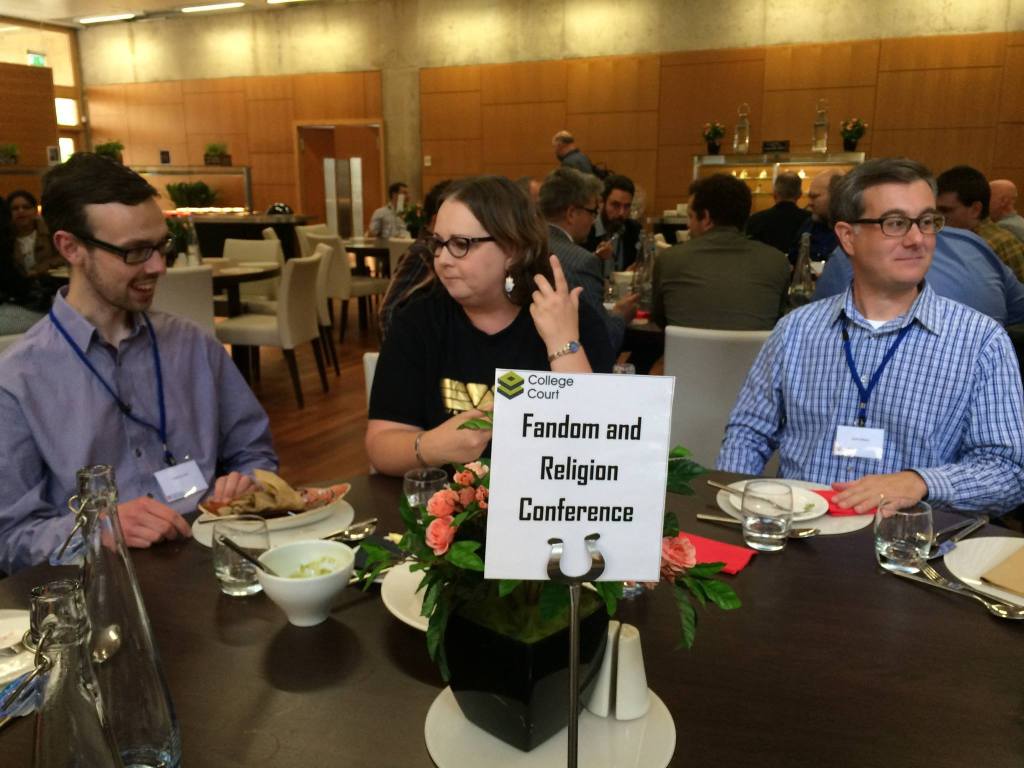Conference report for The Religious Studies Project by our very own Venetia Robertson, RSP Editor and a PhD candidate at the University of Sydney.
The University of Leicester hosted the Fandom and Religion conference this July 28-30 in affiliation with the Theology, Religion and Popular Culture network. A reasonably small conference with just over 30 presenters and 50 attendees, organisers Clive Marshall and Isobel Woodcliffe of Leicester’s Lifelong Learning Centre ran the event smoothly with the help of attentive session chairs and the professional staff at the clean and comfortable College Court conference centre. The Court was truly the home of the conference—with all of the sessions, meals, drinks, and most of our accommodation being there (and with little to do in the surrounding area)—one could be excused for experiencing a bit of cabin fever by end of the week. Still, when tomorrow morning’s keynote speaker is ordering another pint at midnight, we’re probably all glad that bed is just a few steps away from the bar. I want to talk about the papers I saw, and those I wish I’d caught, because that’s primarily what a conference review should be, but I’m also going to take this opportunity to give the study of fandom and religion in general some evaluation, as this conference both pointed out to me the breadth and the dearth of this relatively new academic field.
One of the main draws of this conference for me, and why I was willing to endure the very long plane trip to get there, was the keynote line-up. I heard of this event at last year’s Media, Religion, and Culture Conference, and was excited to see that it would be featuring excellent speakers like Kathryn Lofton (who sadly had to pull out), and scholars whose work my own is intimately connected to, like Chris Partridge and Matt Hills. The way these thinkers combine innovative thinking with the analysis of meaning-making and popular culture highlights, and inspiringly so, the importance of this area of investigation. Partridge and Hill’s plenary papers, ‘Fandom, Pop Devotion, and the Transfiguration of Dead Celebrities’ and ‘Revisiting the “Affective Spaces” of Fan Conventions: Sites of Pilgrimage, Sacredness, and Enchantment… or Non-Places?’ respectively, were both illustrative of the fruitful amalgamation of approaches from media, cultural, and religious studies when examining these developments. I brought together Partridge’s concept of occulture with Hill’s hyperdiegesis in my own paper on how medieval female mystics and modern fangirls use relational narratives with their ‘gods’ to reify sacred subjectivities from within the patriarchal cultures of Christendom and geek culture. On the whole, the conference represented multi- and inter-disciplinary methods, with scholars of anthropology, psychology, music, digital cultures, and literature alongside those of religion. There was, however, in the overall makeup and theme of Fandom and Religion, an unmistakeably strong theological bent—but more on that in a moment.
Though it meant having to miss out on what I heard was a great session on fan experiences in Bob Dylan, indie, and Israeli popular music scenes, and a session on comics and hero narratives that I would have no doubt enjoyed, I felt very satisfied with the methodological offerings from Rhiannon Grant and Emanuelle Burton that dealt with the tensions of canon and fanon, interpretation and creativity, group consensus and personal gnosis, that affect religious and fan communities alike. With a mix of midrashic, pagan, and Quaker approaches to truth and authority, this panel had my mind whirring. Papers on the commercial and the communal aspects of the Hillsong and the role of music in the Pentecostal mega church system provided fascinating insights (and stay tuned for more on this from Tom Wagner). Offerings from Bex Lewis on the Keep Calm and meme on trend and Andrew Crome on My Little Pony fandom, Bronies, and Christianity, proffered some intriguing ways in which viral cultures enable believers to remix media for religious purposes and find the sacred within the secular. Film and television were well represented with talks on American Horror Story, the Alien franchise, small screen vampires, children’s programming, and anime, though I unfortunately could not get to those sessions. Sport, fiction, and celebrity were of course popular topics, with a Harry Potter themed session, and talks on football and faith and evangelism amongst skaters and surfers. Two talks I again missed but would have liked to have caught were the inimitably odd Ian Vincent on tulpas and tulpamancy and François Bauduin’s talk on the Raelians, for what I’m sure would have been a robust discussion of how these esoteric movements translate into the online sphere, and how this affects notions of authenticity and creativity.
 While this program certainly presents a swathe of relevant subjects in the field of fandom and religion, there were several key moments that made me realise that some central issues had gone by the wayside. It struck me that this was a very “white” conference: there were, even for a small number of papers, strikingly none that I could see on non-Western peoples or traditions. A tiny fraction looked at non-Western media and non-Abrahamic religious beliefs. Searching the abstract booklet I found Islam mentioned once, Buddhism only in passing, and no references to countries with historical, pertinent, and I would say seminal engagements with religious fandoms (Japan, India, Vanuatu are just a few examples). When pointed out during the ‘feedback session’ that concluded the conference two responses were offered: one, that there was no one writing on these topics, and two, that it’s a shame that it looks like the conference lacked diversity but that the organizing body does have one Jewish member… In her keynote, Tracy Trothen remarked on the subject of religion and sport that when we say ‘religion’ we usually mean ‘Christianity’, which I had initially interpreted as a reflexive moment on the ‘god problem’ the academy continues to have, that is, the perpetuation of “the myth of Christian uniqueness” despite the reality of pluralism and secularization, but unfortunately it merely signaled the habitual preferential treatment of this one theological outlook. The suggestion that “no one is writing on these topics” is patently false, but is indicative of the core issue I had with this event: it wasn’t just saturated with a Christo-theological focus in material and approach because that’s representative of the academy, but rather it seemed it was primarily interested in representing that viewpoint—and this is something I don’t think was made clear from the outset.
While this program certainly presents a swathe of relevant subjects in the field of fandom and religion, there were several key moments that made me realise that some central issues had gone by the wayside. It struck me that this was a very “white” conference: there were, even for a small number of papers, strikingly none that I could see on non-Western peoples or traditions. A tiny fraction looked at non-Western media and non-Abrahamic religious beliefs. Searching the abstract booklet I found Islam mentioned once, Buddhism only in passing, and no references to countries with historical, pertinent, and I would say seminal engagements with religious fandoms (Japan, India, Vanuatu are just a few examples). When pointed out during the ‘feedback session’ that concluded the conference two responses were offered: one, that there was no one writing on these topics, and two, that it’s a shame that it looks like the conference lacked diversity but that the organizing body does have one Jewish member… In her keynote, Tracy Trothen remarked on the subject of religion and sport that when we say ‘religion’ we usually mean ‘Christianity’, which I had initially interpreted as a reflexive moment on the ‘god problem’ the academy continues to have, that is, the perpetuation of “the myth of Christian uniqueness” despite the reality of pluralism and secularization, but unfortunately it merely signaled the habitual preferential treatment of this one theological outlook. The suggestion that “no one is writing on these topics” is patently false, but is indicative of the core issue I had with this event: it wasn’t just saturated with a Christo-theological focus in material and approach because that’s representative of the academy, but rather it seemed it was primarily interested in representing that viewpoint—and this is something I don’t think was made clear from the outset.
For example, the website for this conference followed on from the flyer that had first alerted me to the “international, inter-disciplinary conference,” and stated that its purpose was to “explore interactions between religion and popular culture” which sounded great. “What is happening to fans as they express their enthusiasms and allegiances? Has fandom replaced or become a form of religion?”—cool, interesting questions, I thought. Compare with this description from a CFP I, after the fact, found elsewhere: “A Major Conference for Faith Community Practitioners and Academics,” “including a session solely for faith community practitioners.” There were actually several ‘practitioner’ sessions, and it seemed clear after a while that ‘faith community’ meant Christian worship. It became explicit from the first day with our welcome that in part this event was for not just religious people but those active in their Churches to learn not so much about, but from fandoms. I am used to attending academic conferences with a notable number of ‘practitioners’ present, they may even present non-academic papers. I am also used to having to define religious studies as a separate disciplinary enterprise to theology. But what I wasn’t expecting in Leicester, and I don’t think I was alone here, was to be at a conference where religion, theology, and Christianity were so automatically synonymous that it didn’t seem to occur to the organisers that major non-Christian themes in religion and fandom had been overlooked in their selection of papers, or even that such themes were major. I wasn’t expecting to feel like such an outsider, as a religious studies academic at what I had thought was an academic religious studies affair.
To be fair, now that I have delved deeper into the faith-based networks that organised this event (Donald Wiebe). However, this issue goes beyond the academy, and this became obvious when a reporter for a religion-themed program on BBC4 interviewed some of the conference’s speakers. What thankfully doesn’t make it into our few minutes of fame in this radio segment is the interviewer’s clear discomfort with the idea of converging ‘obsessive’ fans and their ‘low brow’ media with ‘devoted’ believers and their ‘respectable’ forms of the divine. “Are they [typical othering language] just crazy?” he asks me of fans, and makes me repeat my answer several times in order to get something “more quippy, less academic”, and, I suppose, more damning to confirm his perception that there are right and wrong forms of meaning-making. Journalists from The Daily Mail also tried (but failed) to get a talking head, so I guess things could have been worse.

I certainly don’t mean to detract from the importance of making niche areas like fandom and religion studies visible on an international and interdisciplinary scale, or the much-appreciated effort that went in to the organisation and contribution of this conference and its participants: there was indeed a wealth of interesting, useful, and high-quality papers. Nonetheless, as a reflection on the state of popular culture and its integration into multi-religious studies (not to mention the relevant spheres of civil/quasi/alternative/implicit religion etc.) I feel these criticisms need timely evaluation. And I have some heartening thoughts to that effect: there is a blossoming field of intersectional work on these topics at the moment if one takes the time to look! The promotional material available at Leicester, interestingly, confirmed this, and I include some pictures of it here. I think it’s telling that Joss Whedon studies has had its own journal, Slayage, for over ten years, but to find more journal articles on a vast panoply of religion and fandom junctures you can try the Journal Of Religion And Popular Culture, the classic Journal Of Popular Culture or the newer Transformative Works And Cultures and the Journal of Fandom Studies, whose book reviews keep on top of the most recent additions to this field. This conference also saw the launch of the comprehensive volume, The Routledge Companion to Religion and Popular Culture (which ranges in price between $277 AUD on BookDepository to a whopping $405 at Angus and Robertson), edited by John Lyden and Eric Mazur, as yet another example of the popularity of this topic in contemporary scholarship. I’m also pleased to say that my paper will be a chapter in the forthcoming volume for INFORM/Ashgate, Fiction, Invention, and Hyper-reality: From Popular Culture to Religion (edited by Carole Cusack and Pavol Kosnáč) alongside some brilliant minds exploring the relationship of spirituality to conspiracy theories, Tolkein’s legendarium, Discordianism, with a handful of, yes, practitioner’s accounts, this time from Pagans, Jedis and Dudeists—it’s sure to be a vibrant, diverse, and illuminating contribution to the discussion on fandom and religion.




